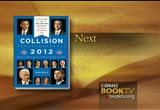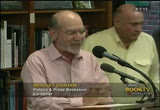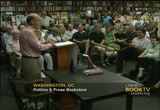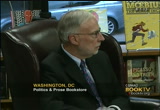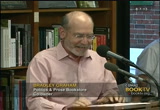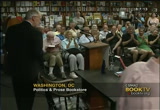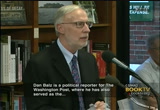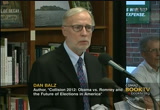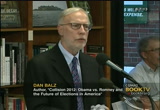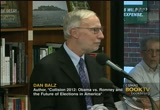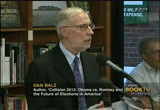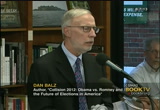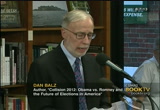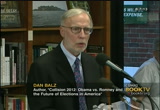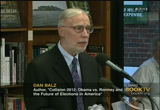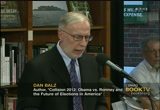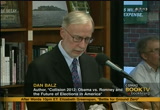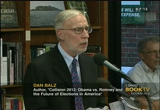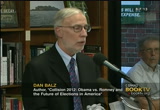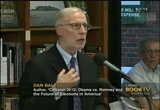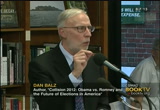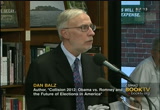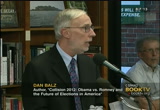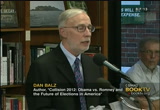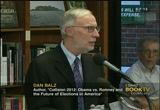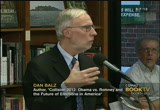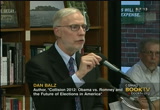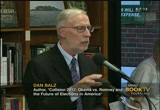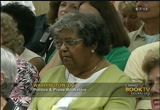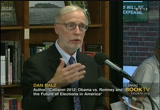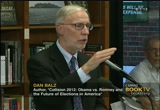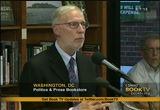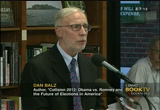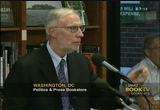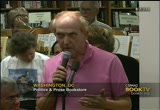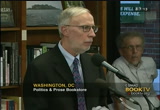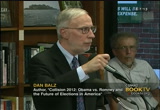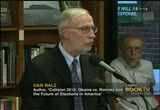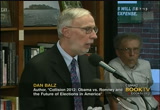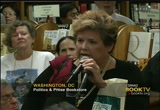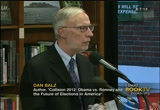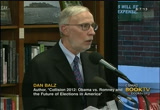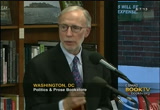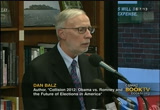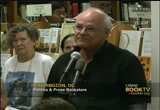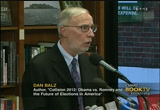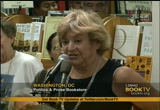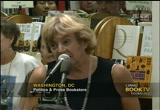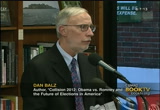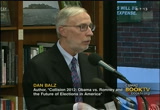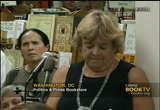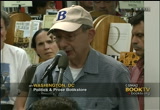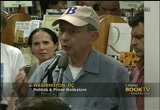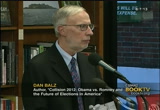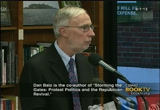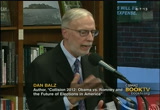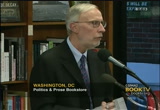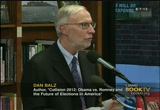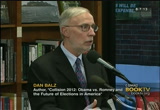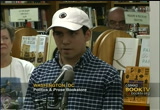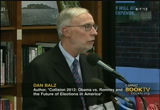tv Book TV CSPAN August 24, 2013 8:00pm-9:01pm EDT
8:00 pm
with an excuse -- exquisite timing we haven't had a senior member of the "washington post" with us. [laughter] said dan balz thought he was coming to talk about his book on the 2012 election but in the wake of monday's surprise announcement that the washington post is being sold to jeff bezos i would guess a few people here are interested in what happening and what's going to happen and where dan works. we will no doubt get to that but
8:01 pm
let me just say whether dan is discussing the goings-on at the "washington post" or the ups and downs of the presidential race he has always stood out among journalists for his smart insight, good keen ability to synthesize, clear writing and ever calm and composed manner. a newspaper that has prided itself first and foremost for its political coverage, there is a reason that dan urged in recent years as they chief correspondent and it's not because everyone else around him died or retired. [laughter] i worked at -- i worked at the post starting their about the time that dan did in 1978 and i have seen him in action many times. his thoroughness, fairness, intelligence and steadiness have
8:02 pm
long made him an unassuming star he has been a white house correspondent, political editor, national editor and became a disciple of sorts to two of the posts great local writers david roeder and james johnson. dan has carried on their tradition of unbiased informed and must-read coverage. his new book, the "collision 2012" obama vs. romney and the future of elections in america is a follow on to the book dan and haynes johnson wrote about the 2008 campaign. and as dan says of the new book, he hadn't expected obama's second run for the presidency to turn out quite as compelling as the first groundbreaking one did but it did. the campaign did turn out to be just as compelling although in
8:03 pm
different ways. howell raines reviewing the book in the post the other day called it quote old-fashioned in a good sense, referring to the fact that it's filled with attributed quotes and closed focus reportage and thankfully lacks windy and alice's. but dam also shows a modern-day appreciation for the new technologies and social media the obama camp aim puts to such effective use. if you really want to understand why the election turned out as it did for america's political future read this book. we will be life tweeting tonight's event speaking of modern technology and social media, so you can follow along with the conversation at hashtag balz dca. dan will speak for a bit and we
8:04 pm
will leave time for questions. if you have a question you will notice the bright lights. we we are on c-span and we are also videoing the event for her own web site so please try to make it to this microphone here so that everybody can pick up your question. afterwards of course dan will be happy to stay and sign copies of his book. given the size of the audience, if you could not all rush up here at once. take some time to fold up your chairs and place them against something solid. we would appreciate it very much. ladies and gentlemen please join me in welcoming dan balz. [applause] is the now the windy analysis begins. brad think you.
8:05 pm
it is a delight to be introduced by a former colleague one of whom i have so much respect and his wonderful wife when they took over politics and prose. sorry. is the mic there? hello? there we go. all right i am paying tribute to read and a lissa for the great work that they have carried on here at politics and prose and as brad said we have a new owner at the "washington post" and at the risk of putting my own job in jeopardy i want to say please patronize the store. [laughter] buy your books here. [applause] whatever else you do is your business but this is one of the great bookstores in america and we want to keep it going. haynes johnson and i, haynes said lee passed away before this book was finished but we were
8:06 pm
here four years ago i think almost on this very night and haynes said something that night that i want to repeat and that is there is nothing more gratifying for an author than to come before people who read and like books and obviously who are interested in and care about american politics. for those of us who love american politics and right hooks about it this this is itsy an audience as we ever get to see. i think all of you for coming out. it's a wonderful crowd and despite what brad said feel free to rush forward with your comments. as brad said this is a sequel to the one that haynes and i wrote in 2008 and as i started this book i did have doubts. as frankly did my publisher. about whether this campaign would produce a story that was going to be as compelling as the 2008 election. without election as we all remember was a historic election and not only because it ended up
8:07 pm
collecting the first african-american present in the history of this country but also the epic struggle he went through to win the democratic nomination and the economic crisis that we went through and also in a sense because of how people felt at the end of the election. remember attending a focus group may be a gear and a half or two years after the election. it was run by peter hart who was doing it for the edinburgh center at the university of pennsylvania and he asked people , put yourself back in election night 2008 until me what you felt and what you thought. this was a focus group of republicans democrats and people who supported obama, people who supported john mccain and any of the number of people who supported john mccain said i actually felt good after that election. peter said why? they said i just felt good for the country. the country of done something important and significant and even though i wanted john mccain to when i felt that something important has happened we knew that this campaign in
8:08 pm
2012 was not going to be here. this was not an uplifting campaign by any stretch of imagination. it was a totally different one and you know it was in many ways a much more sprawling story than we have dealt with in 2008. it had a much victor cast of characters and an unusual cast of characters which we will no doubt talk about tonight. it had a lot of plot twists in some bizarre moments. when the 2008 campaign ended we interviewed the president-elect obama and said at the opening before we get to other questions can't cut before you became a politician you are a writer and obviously wrote the wonderful book. how would you write the story of your own election and he said, well i think it was a novel and i was not the most interesting character in it. [laughter] so i was thinking i was not able to interview the president after
8:09 pm
this election for this book but i had been thinking how would the answer that question about this election? there were times that it was a comic opera. there were times that it was as serious as we have seen and moments of tension and anger. i colleague david maraniss said to me at one point during the campaign during the early stage of the republican race he said with all due respect to you good political writers we need hunter thompson right now to be able to explain what's really going on. so this was what i was dealing with as we started out this two-year cycle from the end of the 2002 at midterms until the november election. and yet at the end of it i thought it produced a story that not only was as compelling as any other but in some ways more in portland and i say that because i think this campaign was much more of a window into
8:10 pm
where america has been, with divided america and also where it may be going and be going in this struggle we are in. and also it is more instructive at this moment in american politics than the campaign was four years ago. in some ways that campaign may have done a -- we thought something might happen as a result of that and it did not and i think there were no illusions about this campaign all the way through it. and as a result as i sat down to write this story it was both more challenging and the end almost more satisfying to try to be able to unpack what had happened and repackage and tell it. i called this book "collision 2012" and to be honest i called it "collision 2012" because i couldn't think of something else in the prospectus but when i got into the campaign i thought there were three reasons why that title was the apt title. the first reason was this
8:11 pm
election in 2012 was a collision between the america that elected barack obama in 2008 and the america that swept republicans into power in the house of representatives in 2010. now they are are some simple answers to that. it was a somewhat different electorate and yet these were two americas that were coming together on the political battlefield in 2012 to try to settle the argument that was there. this was also a collision of philosophies. economic philosophies, the role of government. these are two political parties who have significantly different views of what ought to be done and this was a campaign that offered at least the opportunity for a pretty grandes debate about that. and the third reason was that this was a collision of very different personalities rated if you think of where these two candidates came from and how they got to where they are, it's
8:12 pm
hard to think of a greater contrast in past presidential campaigns. president obama the son of a white woman and an african father and absentee father who abandoned him and the family when he was a kid, to raise sometimes by his single mother and often by his grandparents as his mother was working on her doctorate. grew up in a traditional family and a family of privilege and affluence and his father was a successful business person, later governor of michigan and later a presidential -- at least for 10 minutes or so. and their perceptions of the world were shaped by a totally different experiences. romney's view of the economy and government shaped almost entirely by his role as a business person and obama's shaped by a world in which he grew up, the identity in which he sought and became and the role of a community organizer.
8:13 pm
if you think of those two different worlds, the two different americas and the two different philosophies, the "collision 2012" turned out to be a very apt title. now come for in a book like this there are two ways and in the retelling of any campaign there are two ways to try to do it very and one is from the inside out. one of the great challenges of doing a campaign book frankly is that you know in my role as a daily journalist and all my terrific colleagues who cover -- we cover these campaigns in such minute detail that by the time you get to the end of it you feel you know everything there is to know and yet if you write a book about it part of what your publisher wants imparted what you want to do is to be able to tell more. much of that comes from inside come for what was really happening inside the two campaigns. what were the strategies and the
8:14 pm
arguments that were going on? and so a lot of reporting goes into that. this book is a product of several hundred interviews conducted over a two-year. map. some of them done as part of my daily reporting and some done strictly for the book on the condition that the contents of the interview not be revealed until the book was out. this is a tricky thing if you are writing daily journalism because the people you are interviewing know you are doing that and so i have always tried to say let's talk about events of the past not of the moment. i have always felt it important to try to get people to talk honestly about things at the moment is as its easy for campaign operatives afterwards to revise and extend into shape a story in a different way. and i was pleased in this book that there actually is quite a lot of material in part to cause i was able to get a number for people who ran for president to
8:15 pm
sit down either in the course of the campaign to talk about what they were seeing and feeling or to sit down afterwards. i did a long interview with governor romney in late january. it was a week after being -- the inoculation and i spent 90 minutes with him in his home just outside of boston. it was a fascinating interview. it was interesting in a number of ways. one is there was nobody else there. normally i was used to seeing surrounded by secret service and family and staff and advance people in all of that. i knocked on his door and he greeted me at the door and there was nobody else there. i have the only recorders that were running. i used to recorders. when you lose an interview you feel like you have lost half of your vital organs. i've i put them down between us and asked questions. he was not defensive.
8:16 pm
he was gracious. it's not easy frankly for somebody who has just poured what he put into that campaign as people running for president do to sit down and have a reporter ask a lot of questions. why did you do this are why did you do that? but he was good about it and there were some interesting things that came out of it or ticket really some of the doubts that he had about whether he should run at the beginning of the campaign, whether he was the right person to run and take on president obama, why he ultimately changed his mind on that and felt that he was the right person in the strongest republican and why he was so confident on election day. i said you thought you were going to win and he said i did. i was quite confident. he said not 90% confident that he said i had written a victory speech and i had have not written a concession speech. we later learned learned that paul ryan on that election day was talking to people about
8:17 pm
resigning immediately of chair of the house budget committee and become vice president. he also talked about some of the difficult moments. he talked about self deportation , perhaps one of the most damaging utterances we have seen it did a debate beyond -- and more consequential because this was a person who is about to become the nominee and not a person who was on the stage. he has a totally different view of this and it's interesting to hear him explain his view as if this was not a harsh expression but a more benign way of talking about people going back and leaving the country. he said in my view deportation is a harsh policy and he said this president has deported a lot of people and he said my view is self deportation with the idea that if there are jobs available people will go back. but he still was wrestling with why that had come so
8:18 pm
controversial. we talked at the end about the 47% comment. this is one in which he was still digesting and he got up and got his ipad out and try to read me some of the things that he thought he had said. he still said he didn't say what he actually said. i didn't really say that but he said that became the perception. in fact it was both a reality in the perception but nonetheless he said i knew it was damaging. it was a very bad moment for him and in the end i said to him often are do you think we are in an environment, we were in an environment in which someone took your life experience, that your wealth, the kind of life you have led that in an environment in which most of the country particularly the middle class thinks the rich are doing great and they are being left
8:19 pm
behind that it will always be impossible for someone like you to get elected? he said any that was a problem. i knew that my profile is a problem and i thought i could overcome it and obviously he couldn't. i won't go into all the interesting stuff that came out of the post election and during election interviews. the chris christie stuff frankly is fascinating. he is a character do we will continue to see on the public stage. i went up to see him in trenton and just to tell me about september of last year. tell me about you know the decision and the process he went through and deciding not to run. we were scheduled to talk for about 45 minutes in an hour and a half later he was still telling me the story. it's a fascinating story and he's a fascinating story teller. i just give you one anecdote. he was invited to a breakfast in new york in the summer of 2007. the campaign was well underway at that point and there were a group of money people in new york who were urging him to run.
8:20 pm
one of them invited him to breakfast and he said i thought this would he a relatively small gathering. i walked in the room and there were 60 people there and i thought it would be informal. there were chairs like this line that. there was a speaker phone on the table in the front, some heavy hitters were calling in and urging him to run. he said the last person to speak was henry kissinger. he had some conversations with kissinger and kissinger came to a friend using his cane and he said i have known ex-presidents in my life but being president is about two things, courage and character. he said you have both in your country needs you. i said what did you say? he said he was as close to speechless as chris christie ever is. [laughter] so he wasn't speechless. as he said i said to the group i don't think i'm going to run but i owe to all of you to think about it and he then laid out for me to process which he went through and it is a really interesting moment in the
8:21 pm
campaign. because he is going to be around we will hear more from him. the rick perry interview is interesting in part because when we talked about that iconic moment if you will fit dupes moment. he was very funny about it. he said i went into that debate feeling more confident and relaxed than any debate up to that point. he said you know i was doing good and then i have this brain lapse. that is not a word he used but if you read the book you will see what he said. but he said you know i thought okay this happens to people and it's not going to be that bad. he said they did some immediate repair work nonetheless but he said i went that and slept fine that night. but he said the truth is and these are my words per praising him my campaign was already over at that point. he said i didn't lose the election or the nomination because of what happened in that
8:22 pm
sub light debate. he said i had lost it earlier because of my performance in the earlier debates and he said the thing i learned was you can't going to presidential campaign late if you are not fully prepared and he said i was not prepared for it. there is fresh material on the denver debate. again i won't dwell on all the details but this was one the highpoint for governor romney as he said. he said i had a lousy september and that was 47% in the survey had a great -- and that was denver. day before the debate he got a call from george w. bush and the former president said to mitt romney don't worry about the debate. you are going to do fine. i know from my own experience the president is not going to be fully prepared. this is in fact a truism. and, in president to run for re-election often you lose the
8:23 pm
first debate that they have. there are a lot of reasons. one is they haven't been spoken to for four years in the way they are about to be spoken to by their opponent traded their aides are somewhat more respectful than their opponents on the debate stage. second, they think they're prepared because they have dealing with these issues and they don't feel like they need to freshen up three of he didn't have a good mock debate in his mock debates were from mediocre to really bad. the day of the debate i ran into one of his people in the morning in denver who said what do you think? this person said i'm really worried trade i don't think he's ready for tonight and i'm worried about what is going to happen. as a result of that the stakes were a lot higher in later debates and there was a great moment when the next debate is your call was the vice presidential debate. vice president biden arrives in danville kentucky where the debate was held. he was on the tarmac in his limousine taking a call and he comes out excuse me he said to
8:24 pm
one of his aides who was their, i know we are really in trouble. what do you mean? i know we are in trouble because the president just said to me joe, yourself. [laughter] he said he has never said that to me in four years. [laughter] and in fact he was himself that night and it helps re-rallied the democratic base as a result of that election. one of the things i tried to do in telling the inside story was to talk about the development by the obama campaign of the middle-class message which really in many ways was one of most or t.j. things we were able to do and all of the research that went into it. they went to extraordinary lengths to try to understand better kind of what was in the site he of the american voter including the project in which they asked people to fill out journals not about policies but about their own lives financially and economically
8:25 pm
which produced a 1400 pages of raw material which was digested down which ultimately became a message that allow them basically to leapfrog beyond the question of how do you feel about the economy and how do you feel about the president's handling of the economy to a question where they felt they were on stronger ground. which of these two candidates will be better for your family two years from now come to five years from now, for 10 years from now? the other innovative thing they did and we can talk more about this in questions because i'm sure there will be some, is all the work they did that get out to vote operation and particularly the datamining and the ad-lib aches and they modeling and the use of facebook and social media to give them much more understanding of each of you if you will particularly if you lived in ohio. not the district of maryland. they were less worried than that but if you lived in ohio they
8:26 pm
knew more about you. if they went out on the streets they weren't randomly knocking on doors of people. they knew who stores they need to knock on. they were certain if they got them not to vote for the president or they were actually persuading them because a lot of people would say i'm undecided. i'm really undecided and they developed metrics to figure that out. so that's one way to tell the story and that is a part of this book but the other way to tell a story about a presidential campaign is from the outside in. and by that what i mean is we concentrate so much on television ads and the strategy and the debates and this moment or that moment or this gas or that gas and we get overly fixated on it and yet the things that often decide elections are the things that are in the back round, the forces that are changing everything. this one was obviously the
8:27 pm
economy and the question all along was will this economy just be good enough to allow the present president to win the election or just that enough to deny re-election and is the year went along particularly in the final couple of months the economy improved enough that it made it easier for the president to win and governor romney believes this and so this is senior adviser. one of them said what do you think made the difference? he said a shift in a comment made in the last few months. there were more elements than that but that is one. voter anger is clearly another one. this was always just at the surface is not right at the surface. disaffection across the political spectrum about the
8:28 pm
city and its inability to get some things done but i think the reason it didn't is the third force that was there and that is a red and blue divide in america. i don't think you can at this stage in american politics overstate the importance of that. we are a country that is deeply embedded in red and blue and this election as you look at the results you can argue that the reds got redder and the blue got bluer. this was a relatively close election. it wasn't a landslide by any means. it was not as close as it could have been. it was a four-point election. there were only four states that were decided by five or four points. most states were decided by seven or eight points or 10 points or some states including our biggest days whether new york or california or texas by a landslide margins. the number of counties that switched from one party to the
8:29 pm
next in this was about the lowest ever. it was 207 counties. this is a red and blue country and in the end it's like despite everything else or along with everything else people sorted themselves out in the end rather blue. if people set identify with her papa can party 90 to 95% would vote republican in and the same with the democrats. that has become one of the most significant aspects of our politics. the fourth if you are thinking outside the fourth grade force that was crucially important and was a demographic changes that we have seen over the last several decades. each presidential campaign by presidential campaign the electorate becomes less white in its composition. his still predominantly white but it goes down a couple of percentage points with each election. it was 74% white in 2008 which
8:30 pm
was the lowest it has ever been here day went to chicago back in the spring of the election-year and sat down with jim messina the campaign manager and i was interested in exploring this phenomenon so i said give me her sense of what the electorate will look like on election day. he said we believe that it will be 72% white and 20 8% nonwhite. that is what it turned out to be. barack obama won this election despite winning the smallest share of the white vote of i believe any winning democratic candidate that we have seen. he was able to win because he got 80% of the nonwhite vote and after the election the republicans said we have got a problem here. this is a problem that has been steering republicans in the face for a long time. they may or may not be starting to deal with it.smart
8:31 pm
republicans and we have heard any number of republican strategists talk about this for the better part of the decade. some of the people around george w. bush recognized this and were warning the party ended getting up just 27% of the hispanic vote that is a permanent recipe for losing presidential elections unless they are able to change that. and so what i tried to do in this book was mary up the inside story with the outside story to remind people that the genius of one campaign versus another is often overstated. the winners are never quite as good as we would like to say and the losers are never quite as bad as we would like to say. having said that the romney campaign complex there was a significant error on the part of the romney campaign and all losing campaigns look back with a lot of what it's and we can go
8:32 pm
chapter and verse on some things that the single biggest mistake they made was their misestimation up with the electorate would look like on election day. they overestimated the percentage of the white vote and they underestimated the gap between democrats and republicans in the conversation on the electorate and it is why they had rates closer than the obama campaign and a lot of -- so these are the forces that will continue to shape our politics as we had towards 2016. so with that i will take your questions. thank you. i prosco -- [applause] please remember to come to the microphone so everyone can hear the questions. >> hi. my name is ed green. my name is ed green. >> is it on? there you go.
8:33 pm
see my name is ed grief and i have been involved in politics for 40 some years and have been pulled in over three and campaigns. >> you have to speak up. >> like this? >> there you go. >> first of all i wanted to say before i talk about the political question i have that you and i share something. i was a copy boy at "the washington times" harold in 1954 when we went with the post. al friendly was the managing editor so i have been through a little bit. the question i have and i have done politics for over 40 years in campaigns and my specialty is community organizing is and grassroots organizing. the slight impression that i have is from what i have read in the "washington post" excerpt is that they discovered something that the bush people have discovered previously but in
8:34 pm
fact person-to-person has been the ultimate campaign sends well lincoln talked about it in 1856. i developed a lot of the technology and i think you are correct. this is -- because of technology. today all of the districts have been reshaped so that it's virtually impossible to have anyone running in a district that will shift back and forth and i'm just wondering if it's really the presidential campaigns or a substantive matter of republicans having control of the statehouses, statehouses and control of the district's? >> well, we have talked a long time tonight about the impact of redistricting and there is a debate among political scientists and others about our all our problems the result of
8:35 pm
redistricting? some people say yes. i would say only in part. now obviously with technology can draw these bizarre districts in order to carve out advantages for one party or the other but the other reality is that we live in an america in which people tend to sort themselves out to live near more like-minded people. we see evidence of that around us. that is part of it. your point about the person-to-person campaigning is correct. good campaigns have always wanted to get volunteers out on the street let the bush campaign based on some work done by political scientist at yale, i won't say perfected but improved this by recognizing it's not just person-to-person that is affected. it's if i go to your door because you know me comcast so
8:36 pm
if you are called by somebody you know or if your door is not done by someone you know you are more likely to respond to that than simply a stranger knocking on your door. and with the obama campaign discovered was that it's not just that the door. through facebook they were able to tap into with your permission they could tap into your facebook friends and from their own data they knew what those friends predilections were, how they tended to vote and what issues they cared about. so let's say you watched a video on their their campaign site about health care. you might get an e-mail from the campaign that said you have got three friends on facebook who might be interested to see the same video. why don't you send them a message to encourage them? it was that kind of precision and i talk to the deputy
8:37 pm
campaign manager overseeing a lot up to get out the vote operation and i said to her, do you still believe that the door-to-door is the most effective way to campaigning? she said until this election i would have said yes and she said what we now know is that different people want to be contacted in different ways. what we learned is we figured out what is the right way to contact you are just the right way to contact you and that was part of what they did. again let me just add this caveat. you can talk to the people at headquarters and they can describe this architecture in the most beautiful way and talk to you a bout the amazing software they have got and the data analysis they have done. you then go out on the street with people and you know they don't quite handle it in the exact same way. these are volunteers that are committed but they are not necessarily going to read the script they were given to the
8:38 pm
little sloppy on the street than it sounds like it headquarters. having said that there is no question the obama campaign was more efficient at this than the romney campaign. >> patricia finn. is this on? can you hear may? >> just be globally. >> patricia from saint george's county. thank you for coming. we are thrilled that you are here. can you comment on two aspects of the romney campaign? i was flabbergasted that there was such a disconnect between romney's performance as a governor and his performance in the primary and then how he turned around on so many issues toward the general election. i thought there was a charge connected with the issues. and then i wanted you to comment about how romney got so many things wrong, fundamentally wrong about where the electorate was going to be. >> on the first, when we talked
8:39 pm
about why he had dealt this was in the absurd -- excerpted couple of weeks ago but there is a family gathering in 2010. mitt romney and ann romney and their five sons and daughters-in-law. should he run for president? in 2006 that they were looking at 2008 there was a unanimous vote in favor. in 2010 it was 10 votes no into votes yes. that romney was one of the no votes. so we talked about that and he said two things. one was he said if another republican who i thought would have been stronger to run against president of him had gotten into the race and he specifically mentioned jeb bush i might not have run. he said it was a little grain of salt but he was ready --. in terms of the republican nomination his chief strategist i said here's what we are up against.
8:40 pm
this is an evangelical base party and you are mormon. his is a very conservative party and you are a more moderate conservative from massachusetts. one of the things that we saw with governor romney in the 2008 campaign in the 2012 campaign was this question of if you run in one way in massachusetts he cannot win in 2000 or 2012 with some of those positions particularly on abortion. so it was a question what he would do. there was a big debate and actually there wasn't a big debate. there was a big issue of what he walked back from his health care plan in massachusetts. neal neuhaus who became his pollster went up to massachusetts to pitch the campaign. this was as they were wrapping up. he had done they pull himself just to be armed with some data.
8:41 pm
one of the things he said was you know massachusetts health care plan is a big problem with a lot of republican voters. iowa and new hampshire and south carolina were three crucial states. and he said you have got some options. you could walk away from it and say it was a mistake and i wouldn't do it again. you could say governor patrick has taken it and started it and i don't agree with it. he said before i could basically finished romney said i'm not walking away from it. i'm not going to walk away from it, case closed. part of the reason was because they generally believe that was the right thing to do. others in the campaign said they recognize that had he walked away from it, even if that seemed seems like the politically correct thing to do hewitt and charged with being a flip-flop or so it would brought back -- soviet this conflict about consistency. one of the reasons he said he
8:42 pm
talked about immigration in the debates the way he did was he said i had a record in massachusetts and it was consistent with what i had said in the debates. he said i couldn't suddenly in the debate claim i was in a different position. he was conflicted. i don't think after the primaries he ever effectively move to the center as well as some people have ozzy should do. until the first debate. when i talk to him about that he argued that it wasn't moved to the center. it was a fuller presentation of who he was. he said you get defined by short sound bytes and he said this was the first time the big national audience could see the totality of what i thought so that was it. on the miscalculation and i think it goes back to my regular remarks and that is they thought the electorate was going to be different. they thought an african-american vote in raw numbers and not
8:43 pm
necessarily percentages but in raw numbers would not and could not he is large as it had been in 2008 because that was the first time african-american had run for president and he just thought the enthusiasm level would not be as great. it turned out the african-american vote was significant. this was based on his calculations. >> thank you. i want to thank you for your column. it's very insightful. you covered a lot of ground tonight but one thing i was surprised that you didn't refer to and i think it's a thing that a lot of people had in their heads that was being played out but was there latent racism in this campaign where you felt that perhaps a lot of the white voters just wouldn't go over for an african-american? it happened once and i was surprised that it happened twice actually. i'm proud of that.
8:44 pm
>> i don't know anybody and we have all talked about this. i don't know anybody who has been able to in any real way quantify that. a lot of people have their own views as to how significant or not that was. whenever i have talked the obama campaign about that and frankly this was more of a conversation during the 2008 campaign than in this campaign their view has been to since up as a wash that there are some people who would not vote for an african-american president that there are other people who may be more likely to vote for him because he is african-american. and the president himself said that to me during one of our interviews from the earlier book. and so people will continue to debate how significant it was. i don't think it was, don't think it was a major factor in the outcome of the election by
8:45 pm
any means. >> thanks. hi. i'm a congressional reporter for hispanic outlook magazine and i covered both the conventions mainly interviewing hispanic delegates and i was most interested in talking to the hispanic delegates and the republican convention. almost every delegation has it and especially a growing number of mormon hispanics. this is something i want to ask you about. something that i really notice the difference between the democratic and republican conventions was during the day when there weren't many things going on and on television republicans all met in state -- since i i was the way they identify themselves. the democrats all met and
8:46 pm
identity caucuses. we had the latinos and the blacks and the women's in all that. it seemed to me as a lifelong democrat and this is what i wanted to see what you think. democrats are becoming less and less tolerant of diversity. they seem to put everyone into a group so all women supposedly and all latinos are the same. they are the latino vote. latinos are incredibly diverse and we will see that more and more. and maybe it worked in this election but i'm concerned that they are getting too narrow and they are targeting groups that that -- and i wonder what you think about that? >> it's a really interesting question. identity politics within the democratic party has been an issue that at various times has been helpful or harmful.
8:47 pm
if you have covered it as long as i have you see those moments when i remember paul kirk when he came the democratic already chair abandoned these offices because he felt -- this would have been back in the 80s. because he thought it was not healthy to sort it out in that way. at the same time now we have seen the party has organized. partly that is the professional party. in a sense the dnc and they do that. i don't know what the great significance of that is. i think in a campaign sense when you look at the hispanic vote for example you are right the hispanic vote is certainly differs but it has consistently when you voted with the sizable majority voting democrat doesn't mean it's monolithic any means but it's 65, 70, 72% democratic.
8:48 pm
now can democrats take that for granted? can republicans crack at? that's the big question. a long time ago 30 years ago i was in our bureau in texas during the first reagan administration and spent a lot of time looking at the emergence of the hispanic vote and in fact efforts by the republican party to harness more of those voters and they have been doing it for 30 years without a consistent record of success. they have not been able to grow in any sizable way. george w. bush did very well with hispanics and did pretty well as president. his brother did ewell in florida that says it is possible for a candidate to do pretty well. but if you look at susanna martinez the governor of -- the republican governor of mexico or
8:49 pm
brian sandoval the republican governor of nevada both won elections in 2010 with a minority of the hispanic vote in their states. so it's a struggle even for a hispanic candidate and part of it is with the two parties have stood for. one of the things that both the romney and obama campaign did in this past election is we did a lot of looking at immigration and that was certainly a factor. for half the single biggest factor that pushed more voters to the democrats with health care and the president supported affordable care act. john mccain said last week on the news hour he is always the pushing for confirmation -- at comprehensive immigration bill. the passage of this bill will not win republicans one single hispanic vote that he said what
8:50 pm
it will do is it will put us in a position to begin to compete more effectively for hispanic voters. thank you. >> by name is walter rosenkranz. oh well come to i can't put it in my mouth. [laughter] >> just speak up a little bit. there you go. >> my name is walter rosenkranz and before retiring here is a professor at the university of massachusetts at amherst during which time romney was governor. what i remember and i just wanted to make this comic before and may ask the question. >> keep speaking louder. >> what i remember is there was a minor scandal but the landscape contractors at his home in massachusetts. most of them are undocumented
8:51 pm
illegal immigrants. so it's kind of hypocritical for him to talk about self deportation when he himself was providing the jobs that they came north to take. but that's just a comment. [laughter] what i want to ask you about is what do these elections portend for the future of the governed ability of this country? it seems that the checks and balances that we are so proud of have produced a system that cannot move at all. >> it's mostly checks. >> i'm just reminded when my father was born in 1905 in imperial russia. after world war i his town became part of poland so he knew polish and russian history. i remember him telling me that before the partition of poland in the 18th century by the great powers russia, prussia and
8:52 pm
austria the polish government was run by a parliament consisting of notables and aristocrats. you could not do anything in the polish parliament except by unanimous consent so one person could bring the whole government to its knees. and what happened was the great powers would buy off the nobleman to thwart any policy that would threaten their just in poland and i'm wondering if we are anywhere close to that situation now? >> i don't think we are quite in that same situation but you know we used to think that elections were a moment in which we settled an argument. the campaigns were about putting what plot -- one platform or
8:53 pm
another or one candidate or another at the forefront with their philosophies and the outcome of that would give that person at least some leeway. this election was not that. i think the president came out of this election thinking he had a moment. he came out of it with a more muscular rhetoric. think of the inaugural address. it was a much more robust inaugural address that he had given four years earlier and i think he thought he might be able to work his will more effectively on capitol hill but he has not been able to do that and it's in part because of this red and blue divide in because with republicans having a power base in the house they are able to block and thwart and youth he can get done what he wants and they can get done what they want. i don't know the answer to this. my friend roger simon is here
8:54 pm
and we talked about this over the weekend. he said you have written a very gloomy book and i said well i don't know about that but i mean i felt all the way through this campaign certainly in the last four or five months, i just felt that we were going going to end in the campaign without having resolved the argument that republicans and democrats would still be very far apart and it would be difficult to govern. i think this is a longer-term problem. maybe a different set of personalities will do it and maybe a shock to the system will do it. maybe another defeat for the republicans in a presidential campaign will change something. politics are dynamic and organic and parties change in events change them but right now if you have this phase of this election where they didn't resolve the art meant producing a status quo
8:55 pm
outcome and least in the sense that the house in the senate in the white house remained at the same stance and republicans continue to feel as strongly about what rocco palma is doing and why it's wrong and the president feels that he is right in the country a to go in that direction. i will say one of the things i was struck by a few not grow up just was the president seemed to be pitching his ideas to the america that he believes is now in the national election that majority of americans and we will see going into 2016 how that plays out so thank you. [inaudible] >> quick questions and short answers. speak into the microphone. >> will why did so many people people -- white people not vote? >> the overall vote was down.
8:56 pm
i'm not sure that any group voted in as high a number says they had in 2012. the overall votes for the republican nominee and the democratic nominee was down. there were fewer white votes. i mean i think one reason there were a lot of white voters he did not want to vote for president obama. we had seen that and there were a number of white voters particularly some i would say working class voters who may have been resistant to governor romney and certainly the obama campaign worked and spent tons of money to try to convince them not to vote. if you look at ohio and i will do this quickly. in ohio he outperformed his white vote compared to nationally because them part of the kind of campaign he ran so short answer. next. >> hi. it ingrid nyberg. >> can you speak of up little closer to the my?
8:57 pm
>> ingrid nyberg. do you think that the current effort to suppress the vote will be successful and if so how will it affect the next election in 2016? >> the question is will efforts to suppress the vote be successful and how will it affect the next election? i think you could make an argument that there is a backlash against it and that efforts to do that come at a potential price for the advocates of it and we will see how much effort there is to enact laws and what the reaction is. if you look at what happened with a lot of african-american voters the long lines in florida , the huge turnout that suddenly startled the romney campaign on election day in philadelphia. the obama campaign would say this was an assertion by
8:58 pm
african-americans of we have got your back president obama and we are not going to let anything get in our way of voting. so you know, to this as part of a debate about election laws but it's also part of the emotion that goes into how people decide to vote and how motivated they are to get out to vote. >> good evening. my name is james reid. i am a student at george washington university. >> get a little closer? >> how about now? i can speak loudly. my question concerns the obama family and the romney family and to touch on it briefly and their impact on the campaign. >> well, i think and michelle obama the two candidates head terrific -- the speech that michelle obama gave at the
8:59 pm
democratic convention was arguably one of the two best speeches. this was an odd convention and that the president's speech was that asked the third-best speech. after michelle obama and bill clinton and maybury -- maybe mayor castro of san antonio who certainly outperformed expectations. and gave a very effective speech at the convention and also on the campaign trail. i think it always had an natural quality and determination. she was a fighter on behalf of her husband and so i think both of them were helpful and the families. i think americans of whatever political stripe they were elected each of the families and said these are real families in these are good families. i think those sites had assets. >> thank you. >> one last question.
9:00 pm
128 Views
IN COLLECTIONS
CSPAN2 Television Archive
Television Archive  Television Archive News Search Service
Television Archive News Search Service 
Uploaded by TV Archive on

 Live Music Archive
Live Music Archive Librivox Free Audio
Librivox Free Audio Metropolitan Museum
Metropolitan Museum Cleveland Museum of Art
Cleveland Museum of Art Internet Arcade
Internet Arcade Console Living Room
Console Living Room Books to Borrow
Books to Borrow Open Library
Open Library TV News
TV News Understanding 9/11
Understanding 9/11